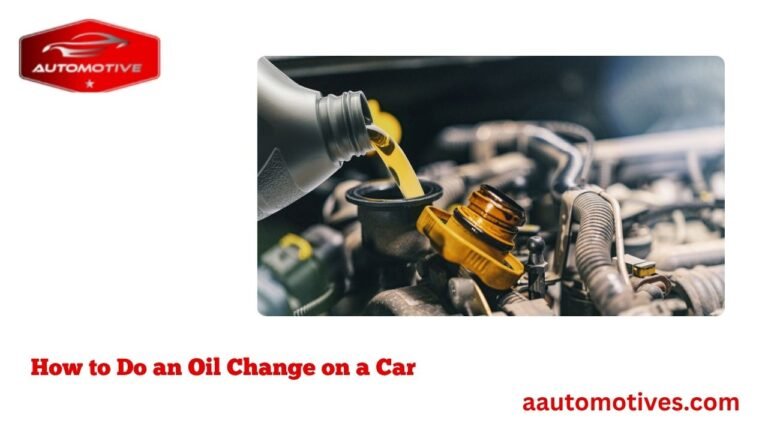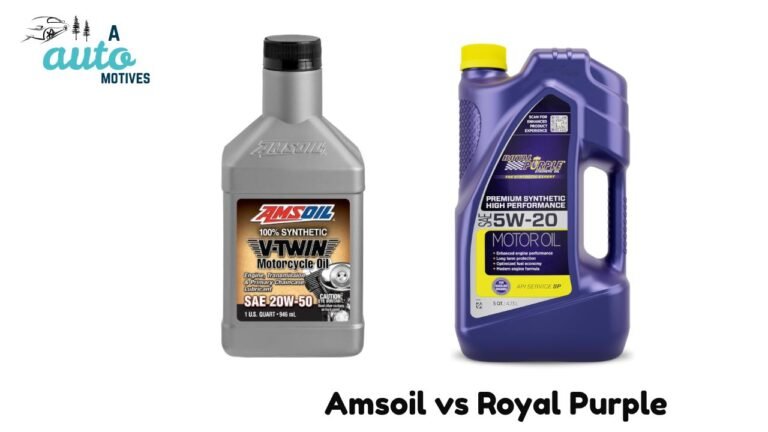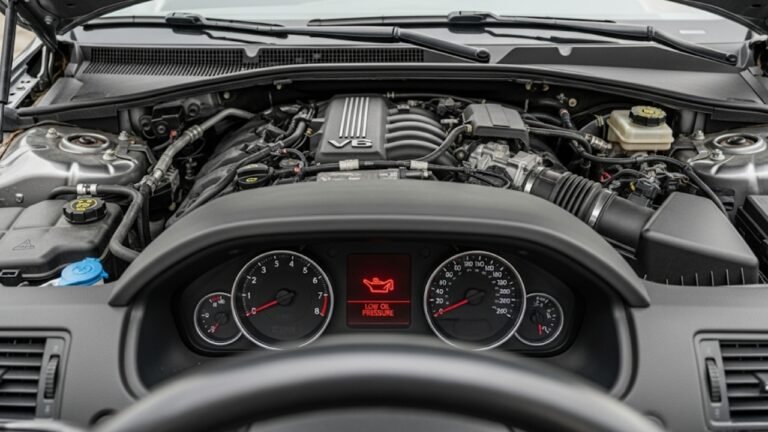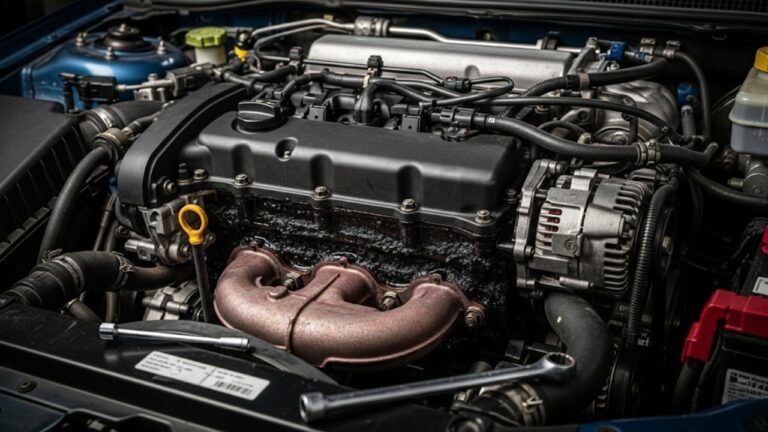When Should You Get Your First Oil Change on a New Car?

There’s something magical about that new car smell, right? You slide behind the wheel, everything is shiny, the engine hums like a lullaby, and for a brief moment, it feels like you’ve made it. But beneath all that excitement, there’s one question many folks ignore—when should you get your first oil change on a New Car?
Some people wait too long. Others do it too soon, spending money they don’t need to. But timing this just right? It’s a small thing that could make or break your engine’s lifespan.
Let’s dive deep into this—no fluff, just real talk. I’ll walk you through what I’ve learned from mechanics, manuals, and my own messy mistakes. We’ll decode confusing advice and give you a plan that works.
Because this isn’t just about oil. It’s about protecting your investment—and your peace of mind.
In This Article
- 1 Breaking In Your Car: What They Don’t Tell You
- 2 So… Really, When Should You Get Your First Oil Change on a New Car?
- 3 The Real Talk on What Your Manual Says
- 4 Oil Isn’t Just Oil Anymore
- 5 My Story: A Lesson in Waiting Too Long
- 6 Signs That You Should Change Your Oil Sooner
- 7 Oil Change Myths That Might Hurt Your New Car
- 8 How to Check Your Oil the Right Way (Yes, Even in a New Car)
- 9 Cost vs Value: Is an Early Oil Change Worth It?
- 10 What Mechanics Really Say (And What They Don’t Advertise)
- 11 Should Your Driving Style Change Early On?
- 12 A Little Care Today, a Lot Less Trouble Tomorrow
- 13 Final Thoughts: This Is About More Than Just Oil
Breaking In Your Car: What They Don’t Tell You

Most manufacturers now pre-fill the car with “break-in oil,” which has additives to help with this early wear. Still, your first oil change is like that first dental cleaning for a kid—it sets the tone.
- Why this matters: Even tiny debris can damage engine parts over time.
- Modern engines are tight: Tolerances are tighter than ever. Clean oil matters more now.
- Peace of mind: Changing oil early gives you control and clarity.
In short? Your first oil change isn’t just about mileage. It’s about your engine’s future.
So… Really, When Should You Get Your First Oil Change on a New Car?
Let’s get to the point. For most modern vehicles, the first oil change should happen between 500 to 2,000 miles. Yep, even if your manual says otherwise.
I’ll tell you why.
When I bought my new compact SUV last year, the dealer told me, “You’re good for 10,000 miles.” I almost believed it. But a seasoned mechanic friend laughed and said, “Change it at 1,500. Trust me.”
He was right.
Here’s what experts and real drivers recommend:
| Mileage | Why It Matters | Oil Condition |
| 500–1,000 | Ideal for performance engines or turbocharged models | Slightly dirty, may contain break-in particles |
| 1,000–2,000 | Best for long-term durability | Start seeing metal debris |
| 3,000+ | Fine for synthetic oils in regular engines | Still clean, but not optimal after break-in |
| 7,500–10,000 | Only follow if your manual specifically allows it | Risk of sludge if break-in not flushed |
In most cases, 1,500 miles is the sweet spot. It’s early enough to clean the engine but not so early that you’re wasting money.
The Real Talk on What Your Manual Says
I get it. You spent thousands on a new ride. You want to trust what the manual says. And yes, officially, many manufacturers now recommend waiting up to 7,500 or even 10,000 miles before your first oil change.
But manuals are written with perfect conditions in mind—ideal climate, gentle driving, no stop-and-go traffic. That’s not real life.
Here’s the hidden truth: they also want to make their cars look low-maintenance. It’s a marketing thing. “Only change your oil once a year!” sounds great in commercials.
But if you care about long-term performance? You’ll be smarter than that.
I know drivers who followed the book and had sludge problems before 50,000 miles. And others who changed oil early and had engines purring past 200,000.
Bottom line? When should you get your first oil change on a New Car? Earlier than your manual says. Trust your instincts—and a good mechanic.
Oil Isn’t Just Oil Anymore
Let’s clear something up. Not all oils are created equal.
When I was a teenager, I thought oil was oil. I’d grab the cheapest bottle at the gas station, pour it in, and call it a day. But with modern engines, that can be a disaster.
There are two main types of engine oil:
- Conventional Oil: Cheaper, breaks down faster, not ideal for new engines.
- Synthetic Oil: More stable, cleaner, lasts longer, perfect for newer models.
Most new cars today use synthetic oil from day one. That means your oil may last longer, but it doesn’t mean you should wait forever to change it. In fact, early changes are even more important with synthetic oil—it’s designed to flush out debris better, but it still needs replacing.
So if you’re wondering, “Should I wait since it’s synthetic?”—the answer is no.
Change it early. Protect your engine. Sleep better at night.
My Story: A Lesson in Waiting Too Long
Let me tell you a quick story. When I got my first brand-new car—a zippy little hatchback—I did exactly what the manual told me. I waited until 7,500 miles for the first oil change.
Around 6,000 miles, I noticed a weird noise. Nothing serious, just a faint ticking. The dealer brushed it off. “Totally normal,” they said.
At 7,200 miles, I changed the oil. It came out black and gritty—not what synthetic oil should look like. There were metal specks in it.
Fast forward a year. That ticking turned into a whine. By 30,000 miles, I needed major work on the timing chain. The mechanic said, “This kind of wear? Shouldn’t happen this early.”
Since then, I always do the first oil change between 1,000 and 1,500 miles. Haven’t had a problem since.
Sometimes, the cost of a $50 oil change is the best insurance you can buy.
Signs That You Should Change Your Oil Sooner
Even if your car is new, your driving habits might speed things up.
You might need to change your oil early if:
- You drive in heavy traffic every day
- You live in extreme heat or cold
- You tow things or carry heavy loads
- Your car idles for long periods
- You hear odd engine noises
- You see oil turning dark too quickly
These are all “severe duty” conditions. And they apply to more people than you think.
I live in a hot, humid city with tons of traffic. That alone puts more stress on my engine oil than a rural driver on open highways. That’s why knowing your own driving context matters as much as following the book.
So ask yourself: Am I driving under ideal conditions? If not, play it safe with your first oil change.
Oil Change Myths That Might Hurt Your New Car
There are so many myths floating around that it’s no wonder drivers get confused. Let’s bust a few of the big ones that often pop up when folks ask, “when should you get your first oil change on a New Car”.
Myth 1: “New cars don’t need early oil changes.”
Wrong. Even if engines are made better today, the break-in process still produces metal particles and micro-friction. These bits hang out in your oil, and early removal is smart—not wasteful.
Myth 2: “Synthetic oil lasts forever.”
Also not true. Yes, synthetic oil lasts longer than conventional oil. But no oil lasts forever. Even synthetic oil can become dirty, especially when it’s capturing debris from a brand-new engine.
Myth 3: “Your dashboard will tell you when to change it.”
Trusting your oil-life monitor sounds modern and easy, but these systems are not foolproof. They’re based on algorithms—not an actual oil inspection. They don’t know if your oil is dirty from break-in wear.
Myth 4: “Changing oil early voids your warranty.”
Completely false. In fact, early oil changes protect your warranty. Just keep receipts and service records. The manufacturer will never penalize you for taking better care of your engine than required.
So, next time someone says “you’re overthinking it,” remind them that engines cost thousands to fix. Oil is cheap. Replacing an engine is not.
How to Check Your Oil the Right Way (Yes, Even in a New Car)
You might think your new car is good to go. But checking your oil is like checking your shoes before a run—it just makes sense.
Here’s how to do it, the right way:
- Park on a level surface. Make sure the engine is off and cool.
- Pop the hood. Look for the oil dipstick—it usually has a yellow or orange ring.
- Pull it out, wipe it clean. Then reinsert and pull it out again.
- Check the level and color. Oil should be amber and smooth—not dark or gritty.
- Smell it. If it smells burnt or metallic, something’s off.
Checking your oil doesn’t just tell you if it’s low—it tells you if it’s dirty. On my own car, I noticed the oil turning dark around 1,300 miles. That was my cue to schedule the first change.
It’s a two-minute habit that saves a whole lot of headache down the road.
Cost vs Value: Is an Early Oil Change Worth It?
Let’s talk numbers for a moment. Say your oil change costs $50–$80. If you change it early—at 1,500 miles instead of 7,500—you’re spending maybe $100 extra a year.
Now let’s say you skip it. Your engine develops early wear. Down the line, that could lead to repairs costing $1,500 to $4,000—or worse, a full replacement.
Here’s a simple cost breakdown:
| Item | Cost | Frequency |
| Early Oil Change | $60 | Once |
| Engine Repair (Timing Chain, Pistons) | $1,500–$4,000 | Unpredictable |
| Engine Replacement | $4,000–$8,000 | Rare, but possible |
| Peace of Mind | Priceless | Always |
The value of changing your oil early is huge compared to the cost. You’re not just buying clean oil—you’re buying security, reliability, and longer engine life.
What Mechanics Really Say (And What They Don’t Advertise)
I’ve chatted with more than a few mechanics over the years. Many of them are honest, hardworking folks who’ve seen every kind of mistake under the hood. And when I asked them, “When should you get your first oil change on a New Car?”—the answer was almost always the same.
“Between 1,000 and 2,000 miles. No question.”
Here’s what they wish more people knew:
- New oil isn’t about looks—it’s about protection.
- Even synthetic oil picks up debris from break-in wear.
- Early changes keep warranty claims easier.
- Oil changes are the cheapest maintenance you’ll ever do.
But here’s the catch: some service centers won’t tell you this. Why? Because selling repairs is more profitable than early maintenance. Sad but true.
The best mechanics are the ones who care more about your car’s future than their invoice total.
Should Your Driving Style Change Early On?
Here’s something people don’t talk about much. During the first 1,000 miles, your driving style matters, too.
Think of your car like a new pair of leather boots. You don’t stomp through mud puddles on day one—you ease into it. The same applies to new engines.
Here’s how to drive during break-in:
- Avoid rapid acceleration
- Don’t tow or haul heavy stuff
- Vary your speeds—don’t cruise at the same RPM for hours
- Let the engine warm up before pushing it hard
Pairing a gentle break-in with an early oil change sets your engine up for smooth sailing. You’ll notice better fuel economy, smoother acceleration, and fewer visits to the shop.
A Little Care Today, a Lot Less Trouble Tomorrow
I get it—when you’re buying a new car, the last thing you want to think about is maintenance. You just dropped a big chunk of cash. You want to enjoy the ride.
But think of oil changes like brushing your teeth. Skipping once isn’t the end of the world. But doing it consistently? That’s what keeps everything clean and strong.
So, when should you get your first oil change on a New Car? Here’s the final word:
- If your car uses synthetic oil, change it at 1,000–2,000 miles.
- If your driving conditions are severe (heat, traffic, hills), lean closer to 1,000 miles.
- Don’t trust dash lights or long intervals—trust your dipstick and instincts.
- And always, keep receipts for your warranty.
That one early oil change could be the best decision you make for your vehicle.
Final Thoughts: This Is About More Than Just Oil
Cars are more than machines. They carry you to work, to loved ones, to big life moments. Taking care of your car means taking care of all the journeys it will take you on.
I’ll leave you with this:
It’s easy to ignore oil when your car feels perfect. But it’s like checking in with a quiet friend—just because they’re not complaining doesn’t mean they don’t need attention.
So, go ahead. Take a moment. Change that oil early. And drive with confidence, knowing you’re giving your car the care it truly deserves.






